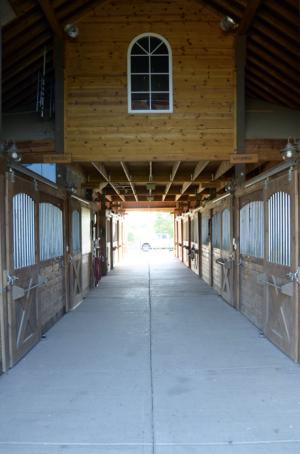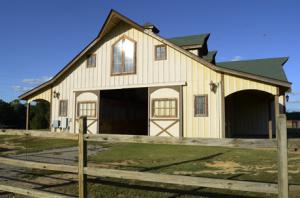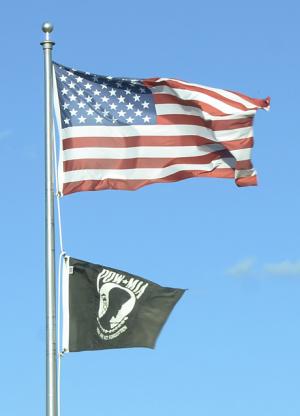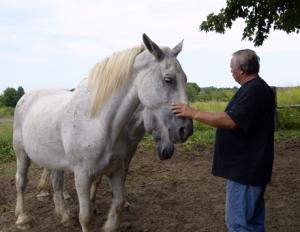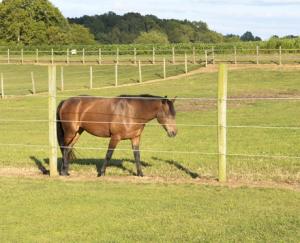By LaCresha Kolba
We all can use a little equine therapy now and then: going out on a relaxing trail ride, forgetting your worries, or talking through a personal therapy session with your horse as the silent counselor. Just breathing in the aroma of our equine friends can help settle anxiety and concerns.
These powerful and majestic beasts with their big soft eyes and kind hearts offer the perfect gift in a therapeutic setting, especially working with military veterans who suffer from PTSD. Interacting with an animal helps a person relax, and that connection with an animal allows one to focus on one thing for just a few moments a day. The problems in one’s life and the world around can “take a back seat” for a while. A lot of veterans have anxiety and traumatic memories, so working with horses puts them in a position to create new memories. Time with a horse helps to replace those not so-pleasant memories. Being next to a horse can be peaceful, and spending time grooming or riding can reduce anxiety.
Elmer Workman spent four years in the Army as a bush sniper with the 25th Infantry. “I spent two years in the jungle, so don’t let television and movies fool you; it isn’t cool. It is hell! You never know if you are gonna stay alive. You know who you are watching, but you don’t know who is watching you. I came back angry, bitter; I was feeling bad. Then I back come to a country that hated me and didn’t treat me very well, even though I had been over there fighting for them.”
Elmer grew up working horses on a farm and has been driving horses since he was 6 years old. “The hills in south Tennessee were too steep for equipment; horses were the only way we could get our work done. When I came back from the jungle, I got back into horses. The only time I didn’t have horses in my life is when I was in the military. [With horses] You treat them right, they will treat you right. They are often better than people; they don’t judge you. They will accept you when no one else will. Riding takes me back to before the war.”
Elmer still works his property with his horses, saying it allows him to slow down. “I can be working the same row for 20 years and still be able to see something new. People say there is no God; but they need to come out here. If they saw what I see, they would know that no one else but God put this here.”
Elmer talked about the trail ride that takes place every year in Westmoreland, TN in September, “A lot of veterans go on that ride. They find their peace on the back of a horse or driving a wagon. Horses are comforting; they aren’t in any hurry. The trail ride allows you to slow down and see what the good Lord put here.”
There are equine therapy programs for veterans all over the country. Some support the military veterans directly, whereas others support the family and offer camps and fun days. These programs are often free, and are effective at helping these individuals who have sacrificed so much to discover the healing effects of a horse. Through the touch, the interaction of horses, they can re-build self esteem, gain emotional balance, and re-connect spiritually. Just like humans, horses experience a variety of emotions, and are intuitive, with distinct personalities. Horses can teach a person self awareness: if you act nervous, they will mirror that behavior. With their forgiving natures, they can offer life lessons in patience, leadership, assertiveness, affection, and much more.
Horses can offer an out-of-the-box style of non-judgmental therapy, which can be difficult to obtain in an office setting. Therapists cannot always find answers or solutions, and yet the interaction with a horse can open up those who have suffered through traumatic events and help them find peace. Horses, being prey animals, and military veterans both have heightened senses, the military veterans’ senses having been heightened while they were at war. Both have a similar understanding of awareness for survival.
The incredible gift a horse can offer is its forgiving nature. This allows those who are troubled to approach a horse repeatedly, make continuous mistakes, work through their frustrations, and yet throughout their session, receive no judgment, from the horse, just the willingness to give another chance. The horse’s patience while someone learns how to cope with their deep inner battle allows even those who have never been around a horse to have an opportunity to find peace. For those who have worked with horses prior to serving in the military, horses allow them to go back to a time and place before the scars of PTSD occurred. The individuals who try equine therapy discover they can fully express themselves; the anger, the hurt, the fear, the pain can all come forward. The horse will respond accordingly to their expression, and allow a deeper level of communication take place. Communication without words, but with action, reaction, emotion, and understanding that allows veteran to smile, laugh, cry and the mind to find peace. The horse, without saying a word, can speak volumes.
The EAGALA Military Services offer equine therapy to service members, veterans, and their families. As the psychological health needs of military members grow, the need for support of military personal increases. EAGALA, the Equine Assisted Growth and Learning Association, was founded in 1999 and is a non-profit organization with certified professionals have specialized training and experience in the military community.
Fallen Heroes Family Camp, a non-profit organization, offers free camp for families and their children who have lost a parent or loved one serving in the military. Fallen Heroes partners with and utilizes the facilities of JML Farms in Springfield, Tennessee. They also work with Fort Campbell Survivors Outreach Services, which extends the invitation to the families to participate in the camp. The focus of the camp is to provide stress-free days in a safe, outdoor environment for military parents, grandparents, and children to get away from their everyday stress and just have fun.
JML Farms is primarily an equine boarding and lesson facility, working with the Fallen Heroes Family Camp organization and Operation Give Back. Barbara Eby is the Director of the Fallen Heroes Family Camp, and works directly with JML Farms, Fallen Heroes Family Camps, Operation Give-Back, and military sites to organize and operate the camps. “Al Stein, one of the owners of JML Farms, is a Vietnam veteran whose dream is to build additional accommodations, such as cabins, a full service kitchen, and host other outdoor activities specifically for military families to have a place to escape their painful memories and loss. In November 2015, the first official weekend long camp will take place, thanks to fundraisers in May. Five to ten families from Fort Campbell will attend the kick-off camp at JML Farms. The camp is not just a riding camp; it is an opportunity to get outside, play, interact with other families, ride/pet horses, play with other animals, hike, scavenger hunt, and let go of daily struggles,” Eby said.
Friday night initiates the camp with an opening ceremony, including Presentation of the Colors by the Robertson County Mounted Patrol, prayer, the Pledge of Allegiance, the National Anthem, and honoring the World War II, Korean War, and Vietnam veteran families attending. Saturday offers a learning experience, Equine 101, with the local mounted Sheriff’s department. After this session, families can elect other sessions including: riding, grooming and tack, crafts, scavenger hunt, or hiking.
The horses involved with Fallen Heroes are not trained “therapy horses,” yet those who have ever been around a horse during a bad day, or while they faced depression, know a simple nicker, nudge, or patience from a horse can lift your spirits.
For those who have served in the military, there are programs available, many of which are introductions to equine therapy in a less formal setting. Programs such as those offered through the EAGALA and EAP (Equine Assisted Psychotherapy) offer an effective approach that allows participants to be involved with equine based activities, such as grooming, feeding, and ground training. Therapeutic riding also promotes re-socialization, as acceptable behaviors are reinforced and unacceptable behaviors are discouraged.
PTSD is something many military veterans experience. When they return from battle, they may return with physical injuries, difficult memories, and even brain injuries. Equine based therapy programs can be less intimidating for military veterans seeking assistance, and can help them find the peace of mind they deserve.
For opportunities to volunteer or get your family involved with the Fallen Heroes Family Camp, contact Barbara Eby at: www.fallenheroesfamilycamp.org or http://www.jmlfarms.com/home.html or visit their facebook page, JML Farms. For more information on equine therapy programs for military veterans and their families, check out: www.eagala.org
We all can use a little equine therapy now and then: going out on a relaxing trail ride, forgetting your worries, or talking through a personal therapy session with your horse as the silent counselor. Just breathing in the aroma of our equine friends can help settle anxiety and concerns.
These powerful and majestic beasts with their big soft eyes and kind hearts offer the perfect gift in a therapeutic setting, especially working with military veterans who suffer from PTSD. Interacting with an animal helps a person relax, and that connection with an animal allows one to focus on one thing for just a few moments a day. The problems in one’s life and the world around can “take a back seat” for a while. A lot of veterans have anxiety and traumatic memories, so working with horses puts them in a position to create new memories. Time with a horse helps to replace those not so-pleasant memories. Being next to a horse can be peaceful, and spending time grooming or riding can reduce anxiety.
Elmer Workman spent four years in the Army as a bush sniper with the 25th Infantry. “I spent two years in the jungle, so don’t let television and movies fool you; it isn’t cool. It is hell! You never know if you are gonna stay alive. You know who you are watching, but you don’t know who is watching you. I came back angry, bitter; I was feeling bad. Then I back come to a country that hated me and didn’t treat me very well, even though I had been over there fighting for them.”
Elmer grew up working horses on a farm and has been driving horses since he was 6 years old. “The hills in south Tennessee were too steep for equipment; horses were the only way we could get our work done. When I came back from the jungle, I got back into horses. The only time I didn’t have horses in my life is when I was in the military. [With horses] You treat them right, they will treat you right. They are often better than people; they don’t judge you. They will accept you when no one else will. Riding takes me back to before the war.”
Elmer still works his property with his horses, saying it allows him to slow down. “I can be working the same row for 20 years and still be able to see something new. People say there is no God; but they need to come out here. If they saw what I see, they would know that no one else but God put this here.”
Elmer talked about the trail ride that takes place every year in Westmoreland, TN in September, “A lot of veterans go on that ride. They find their peace on the back of a horse or driving a wagon. Horses are comforting; they aren’t in any hurry. The trail ride allows you to slow down and see what the good Lord put here.”
There are equine therapy programs for veterans all over the country. Some support the military veterans directly, whereas others support the family and offer camps and fun days. These programs are often free, and are effective at helping these individuals who have sacrificed so much to discover the healing effects of a horse. Through the touch, the interaction of horses, they can re-build self esteem, gain emotional balance, and re-connect spiritually. Just like humans, horses experience a variety of emotions, and are intuitive, with distinct personalities. Horses can teach a person self awareness: if you act nervous, they will mirror that behavior. With their forgiving natures, they can offer life lessons in patience, leadership, assertiveness, affection, and much more.
Horses can offer an out-of-the-box style of non-judgmental therapy, which can be difficult to obtain in an office setting. Therapists cannot always find answers or solutions, and yet the interaction with a horse can open up those who have suffered through traumatic events and help them find peace. Horses, being prey animals, and military veterans both have heightened senses, the military veterans’ senses having been heightened while they were at war. Both have a similar understanding of awareness for survival.
The incredible gift a horse can offer is its forgiving nature. This allows those who are troubled to approach a horse repeatedly, make continuous mistakes, work through their frustrations, and yet throughout their session, receive no judgment, from the horse, just the willingness to give another chance. The horse’s patience while someone learns how to cope with their deep inner battle allows even those who have never been around a horse to have an opportunity to find peace. For those who have worked with horses prior to serving in the military, horses allow them to go back to a time and place before the scars of PTSD occurred. The individuals who try equine therapy discover they can fully express themselves; the anger, the hurt, the fear, the pain can all come forward. The horse will respond accordingly to their expression, and allow a deeper level of communication take place. Communication without words, but with action, reaction, emotion, and understanding that allows veteran to smile, laugh, cry and the mind to find peace. The horse, without saying a word, can speak volumes.
The EAGALA Military Services offer equine therapy to service members, veterans, and their families. As the psychological health needs of military members grow, the need for support of military personal increases. EAGALA, the Equine Assisted Growth and Learning Association, was founded in 1999 and is a non-profit organization with certified professionals have specialized training and experience in the military community.
Fallen Heroes Family Camp, a non-profit organization, offers free camp for families and their children who have lost a parent or loved one serving in the military. Fallen Heroes partners with and utilizes the facilities of JML Farms in Springfield, Tennessee. They also work with Fort Campbell Survivors Outreach Services, which extends the invitation to the families to participate in the camp. The focus of the camp is to provide stress-free days in a safe, outdoor environment for military parents, grandparents, and children to get away from their everyday stress and just have fun.
JML Farms is primarily an equine boarding and lesson facility, working with the Fallen Heroes Family Camp organization and Operation Give Back. Barbara Eby is the Director of the Fallen Heroes Family Camp, and works directly with JML Farms, Fallen Heroes Family Camps, Operation Give-Back, and military sites to organize and operate the camps. “Al Stein, one of the owners of JML Farms, is a Vietnam veteran whose dream is to build additional accommodations, such as cabins, a full service kitchen, and host other outdoor activities specifically for military families to have a place to escape their painful memories and loss. In November 2015, the first official weekend long camp will take place, thanks to fundraisers in May. Five to ten families from Fort Campbell will attend the kick-off camp at JML Farms. The camp is not just a riding camp; it is an opportunity to get outside, play, interact with other families, ride/pet horses, play with other animals, hike, scavenger hunt, and let go of daily struggles,” Eby said.
Friday night initiates the camp with an opening ceremony, including Presentation of the Colors by the Robertson County Mounted Patrol, prayer, the Pledge of Allegiance, the National Anthem, and honoring the World War II, Korean War, and Vietnam veteran families attending. Saturday offers a learning experience, Equine 101, with the local mounted Sheriff’s department. After this session, families can elect other sessions including: riding, grooming and tack, crafts, scavenger hunt, or hiking.
The horses involved with Fallen Heroes are not trained “therapy horses,” yet those who have ever been around a horse during a bad day, or while they faced depression, know a simple nicker, nudge, or patience from a horse can lift your spirits.
For those who have served in the military, there are programs available, many of which are introductions to equine therapy in a less formal setting. Programs such as those offered through the EAGALA and EAP (Equine Assisted Psychotherapy) offer an effective approach that allows participants to be involved with equine based activities, such as grooming, feeding, and ground training. Therapeutic riding also promotes re-socialization, as acceptable behaviors are reinforced and unacceptable behaviors are discouraged.
PTSD is something many military veterans experience. When they return from battle, they may return with physical injuries, difficult memories, and even brain injuries. Equine based therapy programs can be less intimidating for military veterans seeking assistance, and can help them find the peace of mind they deserve.
For opportunities to volunteer or get your family involved with the Fallen Heroes Family Camp, contact Barbara Eby at: www.fallenheroesfamilycamp.org or http://www.jmlfarms.com/home.html or visit their facebook page, JML Farms. For more information on equine therapy programs for military veterans and their families, check out: www.eagala.org
